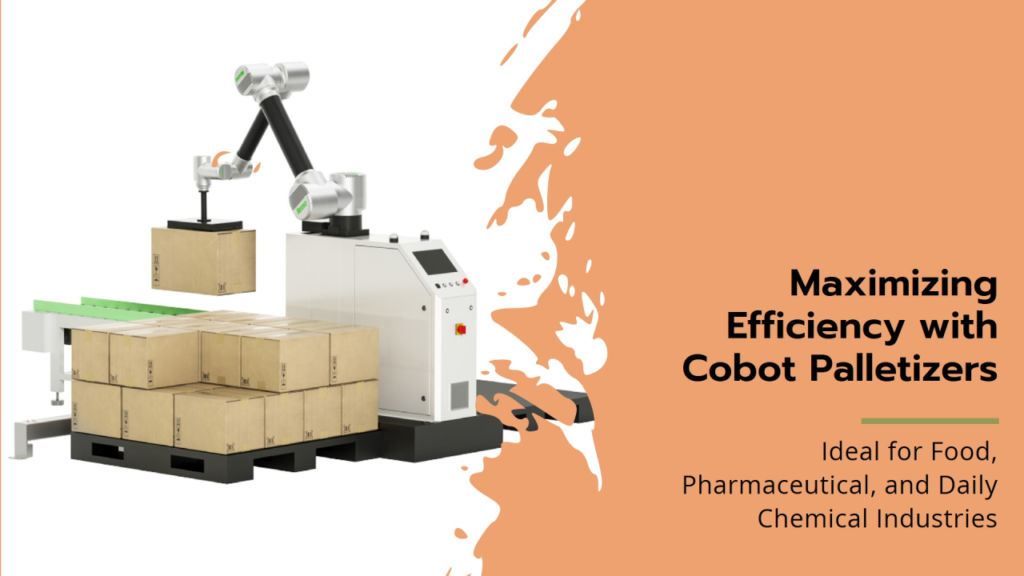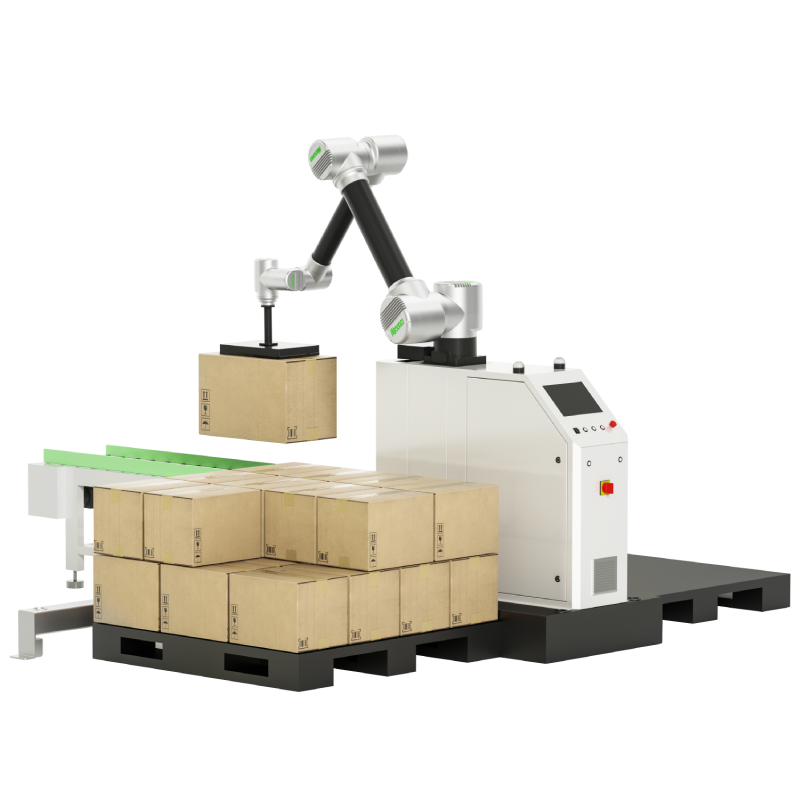Introduction
In today’s competitive industrial landscape, automation plays a pivotal role in improving productivity, enhancing efficiency, and reducing operational costs. Among the cutting-edge technologies reshaping industries, cobot (collaborative robot) palletizers are becoming increasingly popular. These machines are designed to work alongside human operators, offering a blend of automation and human flexibility. Particularly in industries like food, pharmaceuticals, and daily chemicals—where precision, speed, and safety are paramount—cobot palletizers are revolutionizing material handling processes.
This blog explores the key benefits of cobot palletizers, highlighting their value for both small and large businesses in these regulated, high-stakes industries.
1. Increased Efficiency and Speed in Food, Pharmaceutical, and Chemical Industries
Food Industry: In food manufacturing, cobot palletizers improve speed and efficiency in packaging operations. Cobots can handle a variety of products—ranging from cartons and bags to bottles and boxes—by palletizing them quickly and accurately. By automating these tasks, businesses can drastically reduce human labor time while increasing throughput. This allows food manufacturers to meet growing consumer demand without compromising on product quality.
Pharmaceutical Industry: The pharmaceutical sector requires extreme precision and efficiency, particularly when it comes to packaging and organizing sensitive products. Cobots enhance the accuracy and speed of palletizing pharmaceutical products, ensuring they are neatly and securely stacked. By reducing manual labor, companies can minimize human error, prevent costly mistakes, and speed up their packaging processes. This is especially beneficial for high-demand drugs or sterile products that need to be handled with care.
Chemical Industry: For the daily chemical industry, cobot palletizers offer solutions that handle bulk chemicals and other hazardous materials safely. Cobots are designed to work in environments where human workers would face significant risks, such as in environments with toxic or corrosive substances. By performing repetitive tasks at high speeds, cobots ensure that material handling is both efficient and safe.
2. Cost Savings and ROI in Highly Regulated Industries
The upfront cost of cobot palletizers may seem high, but the long-term savings they offer make them an excellent investment for businesses in highly regulated industries.
Food and Pharmaceutical: In food and pharmaceutical industries, labor costs are significant, especially when accounting for the need to hire workers who must undergo extensive training. Cobots reduce the need for as many human laborers, allowing businesses to cut costs without sacrificing quality. Additionally, cobots help ensure compliance with industry regulations—by minimizing errors and optimizing packaging operations—reducing the likelihood of costly recalls.
Chemical Industry: For the chemical industry, safety is of utmost importance. Cobots reduce the risks of human exposure to harmful chemicals, which can lead to costly accidents and health-related claims. By automating hazardous tasks, businesses not only protect their workers but also avoid expenses associated with safety violations, regulatory fines, and operational downtime.
3. Enhanced Worker Safety and Reduced Risk of Contamination
Food Industry: Safety and hygiene are non-negotiable in the food industry. Cobots reduce the chances of contamination by minimizing direct human contact with food products during the packaging process. With their clean, precise movements, cobots ensure that food products are handled without the risk of contamination from human hands, which is critical in maintaining food safety standards and customer trust.
Pharmaceutical Industry: The pharmaceutical industry is heavily regulated, and even the slightest contamination can lead to significant consequences. Cobots operate in cleanrooms, reducing the potential for human error and contamination. By automating the palletizing process in these sterile environments, cobots not only reduce human exposure to sensitive pharmaceutical products but also improve adherence to stringent regulatory standards.
Chemical Industry: In the chemical industry, cobots minimize the risk of exposure to hazardous materials. By handling dangerous chemicals and performing repetitive tasks like palletizing, cobots ensure that human workers stay safe from harmful substances. The result is fewer workplace injuries and improved overall safety.
4. Flexibility and Scalability for Small and Large Businesses in Regulated Industries
Food Industry: Cobots are highly adaptable and can be easily integrated into different stages of the food production line. Whether it’s packing boxed cereals, canned goods, or bottled beverages, cobot palletizers can be programmed to handle various types of products. This flexibility makes them an ideal solution for both small food manufacturers looking to improve their packaging processes and large businesses with high-volume production needs.
Pharmaceutical Industry: In the pharmaceutical industry, cobots can handle packaging in various batch sizes, from small runs to large-scale production. They can easily switch between tasks such as stacking bottles, organizing vials, or preparing large pallets of pharmaceutical products. This scalability allows both small pharmaceutical companies and large enterprises to automate their palletizing processes efficiently, regardless of their production volume.
Chemical Industry: For the chemical industry, cobots can be adapted to handle everything from small chemical containers to large industrial drums. Their ability to scale makes them useful for both small chemical manufacturers and large multinational companies looking to improve operational efficiency. Additionally, cobots can be programmed to meet the specific safety and handling requirements unique to different chemical products.
5. Easy Setup and Minimal Training for Highly Specialized Industries
One of the major advantages of cobot palletizers is how easy they are to implement. Unlike traditional robots, which require specialized technical knowledge for setup and operation, cobots are user-friendly and can be quickly deployed in manufacturing environments.
Food and Pharmaceutical: In the food and pharmaceutical industries, where operational efficiency and minimal downtime are critical, cobots offer a smooth integration process. Their user-friendly design means that operators do not need advanced technical expertise to program or operate the systems. This reduces the need for extensive training and allows businesses to quickly realize the benefits of automation.
Chemical Industry: For the chemical industry, ease of setup is crucial in ensuring safety and compliance. Cobots can be set up with minimal disruption to daily operations. They are designed to be flexible and adaptable, which means they can be integrated into various material handling tasks with little training required for the operators.
6. Accuracy, Consistency, and Compliance in Critical Industries
Food Industry: Cobots excel in tasks that require high accuracy and consistency. By automating the palletizing process, they ensure that each food product is correctly stacked, preventing errors that might lead to product damage. In addition, cobots help businesses comply with industry regulations related to packaging, handling, and labeling, making them a key asset in the food sector.
Pharmaceutical Industry: In the pharmaceutical industry, where adherence to regulations such as Good Manufacturing Practices (GMP) is mandatory, cobots ensure accuracy in every step of the palletizing process. Their precision in handling pharmaceuticals ensures that products are properly packaged, labeled, and stacked in accordance with regulatory requirements.
Chemical Industry: Cobots in the chemical industry provide precision that ensures compliance with safety standards. With their ability to handle chemicals accurately, cobots minimize the risk of spills, mishandling, or incorrect packaging, which helps companies stay compliant with environmental and safety regulations.
7. Environmental Benefits in Sustainable Industrial Practices
Cobots also contribute to sustainability efforts in various industries by reducing waste and energy consumption.
Food and Pharmaceutical: By optimizing packaging processes, cobots help minimize waste and improve the overall efficiency of production lines. In the food industry, where product packaging plays a major role in sustainability efforts, cobots ensure that packaging is both efficient and cost-effective. In pharmaceuticals, cobots can also help reduce the waste generated by manual packaging methods.
Chemical Industry: In the chemical industry, cobots contribute to eco-friendly practices by reducing the waste associated with manual palletizing and improving energy efficiency. With fewer operational errors, businesses can reduce the environmental impact of their production processes.
Conclusion
The use of cobot palletizers offers immense benefits for businesses in the food, pharmaceutical, and daily chemical industries. These technologies provide increased efficiency, cost savings, and enhanced worker safety, while ensuring regulatory compliance and environmental sustainability. Whether for small operations looking to automate their processes or large companies striving for greater productivity and accuracy, cobot palletizers are an investment that pays off in the long run.
By integrating cobots into their supply chains, businesses can not only improve their operational efficiency but also stay ahead of the curve in an increasingly competitive global market.
Optional FAQs Section
What is a cobot palletizer and how does it benefit food, pharmaceutical, and chemical industries? A cobot palletizer is a collaborative robot that works alongside human workers to automate the process of stacking and organizing products on pallets. In the food, pharmaceutical, and chemical industries, cobots offer benefits such as increased speed, precision, reduced contamination risks, and improved safety.
Are cobot palletizers suitable for handling food products? Yes, cobot palletizers are designed to handle a wide range of food products, reducing direct human contact with the items and minimizing contamination risks. This ensures food safety and compliance with industry regulations.
How do cobot palletizers improve worker safety in hazardous environments? Cobots take on the dangerous and repetitive tasks in hazardous environments, reducing the risk of exposure to harmful chemicals, toxins, or other safety hazards. This improves workplace safety and decreases the likelihood of workplace injuries.



